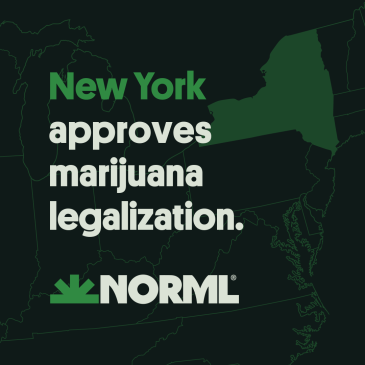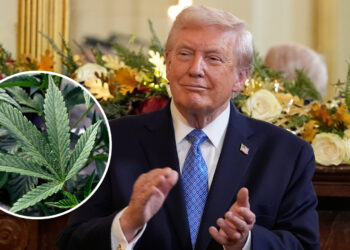
New York State lawmakers today advanced The Marijuana Revenue and Taxation Act (MRTA), which legalizes and regulates an adult-use commercial marijuana market in New York State, and also permits those over the age of 21 to cultivate personal-use quantities of cannabis in their own homes. Governor Andrew Cuomo is expected to sign the bill imminently.
“These votes are historic because they signal the beginning of the end of the racially discriminatory policies that have long made the Empire State the marijuana arrest capital of the United States, if not the world,” stated NORML Executive Director Erik Altieri, “Once enacted, this measure will end the practice of annually arresting tens-of-thousands of New Yorkers for low-level marijuana offenses, the majority of whom are overwhelmingly young, poor, and people of color.”
NORML’s Deputy Director Paul Armentano added, “The passage of legislation legalizing the adult-use marijuana market in New York State will not only have serious economic and social justice ramifications for its nearly 20 million residents, but it no doubt will have ripple effects across the nation and arguably also within the halls of Congress — providing further pressure on federal lawmakers to amend federal law in a manner that eliminates the existing inconsistencies between state and federal cannabis policies.” Six percent of US House members represent New York State, and seven percent of all Congressional House Committee and Subcommittee Chairs are from New York.
Empire State NORML Deputy Director Troy Smit said, “We stand on the shoulders of giants. It’s taken a great amount of work and perseverance by activists, patients, and consumers, to go from being the cannabis arrest capital of the world, to lead the world with a legalized market dedicated to equity, diversity, and inclusion. This might not be the perfect piece of legislation, but today, cannabis consumers can hold their heads high and smell the flowers. Senator Krueger and Assemblywoman Peoples-Stokes have laid the groundwork for marijuana justice and a consumer-centric industry. Now, it’s time for the Office of Cannabis Management to take up their torch and implement regulations that protect patient and consumer rights. In the words of our late Director, Doug Greene – Cannabis Excelsior!”
The Act allows adults to obtain marijuana from state-licensed retailers or grow their own (up to three mature plants at one time). The measure also facilitates the automatic review and expungement of past convictions for offenses made legal under the MRTA. Hundreds of thousands of New Yorkers will receive legal relief under this provision.
Regulators would license commercial producers and sellers of cannabis, as well as issue licenses for delivery services and on-site consumption facilities. Retail sales will be taxed at nine percent, plus up to a four percent local tax, as well as an additional tax based upon THC content. Forty percent of tax revenue will be directed toward communities disproportionately impacted by cannabis prohibition. Provisions in the MRTA seek to award half of all business licenses to social equity applicants.
New York: Quinnipiac University Poll (March 2021):
- Voters say by a more than 2 to 1 margin (64 – 29 percent) that they support allowing adults in New York State to legally possess small amounts of marijuana for personal use.
Law enforcement in New York has historically arrested its citizens for marijuana at astonishing rates. According to a 2020 report published by the American Civil Liberties Union, in 2018, almost 60,000 New Yorkers were arrested for marijuana law violations. Of those arrested, 95 percent of defendants were charged with possession only. Arrests for the possession of marijuana in the state made up over half of all drug arrests in 2018. Three New York counties (Columbia, Greene, Washington) fell within the top 20 in the nation for the most marijuana possession arrests per capita. More recent data, issued weeks ago by The Legal Aid Society, found that in the five boroughs in New York City for the year 2020, Black and Hispanics comprised over 93 percent of those arrested for marijuana violations.











